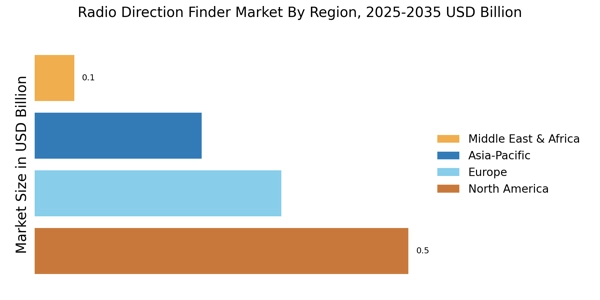Miniaturization Trends in Radio Direction Finder Market
The radio direction finder Market is experiencing notable trends in miniaturization, which are reshaping the design and functionality of direction-finding devices. As consumer preferences shift towards compact and portable solutions, manufacturers are focusing on developing smaller, lightweight radio direction finders without compromising performance. This trend is particularly evident in the military and aerospace sectors, where space and weight constraints are critical. The miniaturization of components, coupled with advancements in materials science, is enabling the production of highly efficient and versatile direction finders. The market is projected to benefit from this trend, as smaller devices are increasingly adopted for various applications, including search and rescue operations, surveillance, and emergency response. This shift towards miniaturization is likely to enhance the overall market appeal and accessibility of radio direction finders.
Technological Advancements in Radio Direction Finder Market
The Radio Direction Finder Market is experiencing a surge in technological advancements that enhance the accuracy and efficiency of direction-finding systems. Innovations such as digital signal processing and advanced algorithms are being integrated into radio direction finders, allowing for improved performance in various applications, including aviation, maritime, and military operations. The market is projected to grow at a compound annual growth rate (CAGR) of approximately 5.2% from 2025 to 2030, driven by these technological improvements. Furthermore, the incorporation of artificial intelligence and machine learning into radio direction finding systems is likely to revolutionize the industry, enabling real-time data analysis and decision-making. This trend not only boosts operational capabilities but also expands the potential applications of radio direction finders across different sectors.
Growing Military Applications of Radio Direction Finder Market
The Radio Direction Finder Market is significantly influenced by the growing military applications of direction-finding technologies. Armed forces worldwide are increasingly recognizing the strategic advantages offered by radio direction finders in intelligence, surveillance, and reconnaissance (ISR) operations. The market is anticipated to expand as defense budgets increase and nations invest in advanced communication and navigation systems. The integration of radio direction finders into military platforms enhances situational awareness and operational effectiveness, making them indispensable tools for modern warfare. Furthermore, the ongoing geopolitical tensions and the need for enhanced defense capabilities are likely to drive demand for sophisticated direction-finding solutions. As a result, the military segment is expected to account for a substantial share of the overall market, fostering innovation and development in radio direction finding technologies.
Increased Demand for Safety Solutions in Radio Direction Finder Market
The Radio Direction Finder Market is witnessing a heightened demand for safety solutions, particularly in sectors such as aviation and maritime navigation. As safety regulations become more stringent, organizations are increasingly adopting radio direction finders to enhance situational awareness and ensure compliance with safety standards. The market for radio direction finders is expected to reach USD 1.2 billion by 2030, reflecting a growing recognition of the importance of reliable navigation and communication systems. This demand is further fueled by the rising number of air traffic incidents and maritime accidents, prompting stakeholders to invest in advanced direction-finding technologies. Consequently, the integration of safety features into radio direction finders is likely to become a key differentiator in the market, driving innovation and competition among manufacturers.
Emerging Applications in Commercial Sectors of Radio Direction Finder Market
The Radio Direction Finder Market is witnessing the emergence of diverse applications in commercial sectors, which is contributing to its growth. Industries such as telecommunications, transportation, and emergency services are increasingly adopting radio direction finders for various purposes, including signal tracking, navigation, and search operations. The market is projected to grow as businesses recognize the value of accurate direction-finding technologies in enhancing operational efficiency and safety. For instance, transportation companies are utilizing radio direction finders to optimize routing and improve communication systems. Additionally, the rise of smart cities and the Internet of Things (IoT) is likely to create new opportunities for radio direction finders, as they become integral to urban infrastructure and public safety initiatives. This diversification of applications is expected to broaden the market landscape and stimulate further innovation.

















